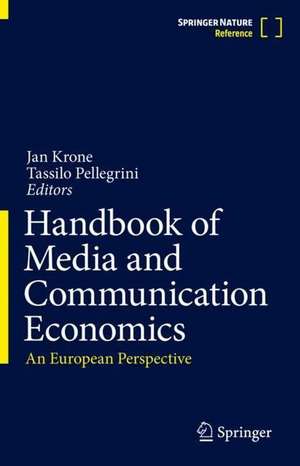Handbook of Media and Communication Economics: A European Perspective
Editat de Jan Krone, Tassilo Pellegrinien Limba Engleză Hardback – 29 sep 2024
This handbook maps the media economy in its entirety against the background of the advancing digitalization of communication, media production, media distribution and the adaptation of regulatory framework conditions from different disciplinary approaches. It provides an integrated view on digitally induced economic transformations of the European media sector, and gives an explicitly European perspective on media economics – challenging the dominant US-American view.
Topics covered include, but are not limited to: Theoretical approaches to media economics; media technologies and data management in media economics; building blocks of the media industry; media types and core distribution markets; system aspects and communication culture; media systems and regulatory policy; as well as methods of media economics.
The handbook is a must-read for students, teachers and researchers in media and communication economics and science,as well as practicioners and policy-makers at the nexus of media, business and politics.
Preț: 5088.28 lei
Preț vechi: 6695.10 lei
-24% Nou
Puncte Express: 7632
Preț estimativ în valută:
973.66€ • 1019.13$ • 810.38£
973.66€ • 1019.13$ • 810.38£
Carte tipărită la comandă
Livrare economică 27 martie-02 aprilie
Preluare comenzi: 021 569.72.76
Specificații
ISBN-13: 9783658399085
ISBN-10: 3658399082
Ilustrații: XXX, 1502 p. In 2 volumes, not available separately.
Dimensiuni: 155 x 235 mm
Ediția:2024
Editura: Springer Fachmedien Wiesbaden
Colecția Springer
Locul publicării:Wiesbaden, Germany
ISBN-10: 3658399082
Ilustrații: XXX, 1502 p. In 2 volumes, not available separately.
Dimensiuni: 155 x 235 mm
Ediția:2024
Editura: Springer Fachmedien Wiesbaden
Colecția Springer
Locul publicării:Wiesbaden, Germany
Cuprins
Advertising Decline as a Media-Economic Factor: From Two-Sided Markets to Datafication in Journalism.- Book/Book Groups.- Changing Use of Audiovisual Media.- Classical Political Economy.- Commercial Audience Market Research.- Controlling in media companies.- Corporate Social Responsibility in Media Companies.- Crisis Management in Media Companies.- Critical Political Economy.- Daily, Weekly, and Free Newspapers and Advertising Journals.- Databases, Data Warehousing, and Data Analytics.- Digital Rights Management. Technologies, Application Areas and Development Perspectives.- Film and Cinema in the Age of Media Convergence.- Four Zones, Four Concepts, Actors with a Past: A Special Story of the Beginning. Allied Media Regulation in Austria.- Government Subsidies to News Media. Theories and Practices.- History of Journalism.- Industrial Economics.- Institutionalist Theoretical Approaches for Media Economics.- Journalism and Advertising. On the Separation of Editorial Content and Commercial Communication.- Key Aspects of Media Production.- Lectures for Digital Residents. Preface to the Handbook of Media and Communication Economics.- Management of content in the core processes of production and distribution.- Mass Media Communication. Mass communication as an economic good.- Measurement of media concentration: Empirical concepts, applications and challenges.- Media Brand Management.- Media Business Model Management: A Synopsis.- Media Competence. Challenges in Dealing with Converging Media Offerings.- Media Concentration: Problem and Regulation.- Media Goods Between Economic and Cultural Assets.- Media Innovations and Media Revolutions. From Gutenberg to Berners Lee.- Media Meritocracy. A Question of Preferences. Interpretations of the Context of Need Decide on the Supply Policy of Mass Media.- Media planning.- Media Policy in Hybrid Media Systems.- Media regulation in Switzerland since 1945.- Media Regulation of Allied Germany.- Media Regulation of the European Union.-Media Self-Regulation.- Media Technology as an Entrepreneurial Diversification Factor.- Media use.- Methods of Media Economics.- Micromedia – Mobile Communication.- Music.- Net neutrality and digital media distribution.- News Agencies.- Non-Commercial Broadcasting.- Online Media/Net Media as Journalistic Offerings.- Periodicals/Subject Groups.- Public Broadcasting.- Public Service Broadcasting in Europe and the USA.- Public Sphere Conceptions: Public Sphere Theory.- Public Value.- Radio.- Resilience of Hyperlocal Media in a Global Media Environment.- Rights Management and Licensing.- Service Economics and Media – Media Producer and Media Consumer as Value Creation Partners A Service Theory Approach to Media.- Social Dimensions of Advertising Communication.- Social Media.- Technology and Media Acceptance. A Theoretical Modelling to Weigh User Demand for Communication Services in the Media Transition.- The History of Media Economic Thought in the German-Speaking World up to the Year 2000.- The Media and Communication Economics: Foreword by the Editors.- Value Creation System Linear Television.- Wider, Deeper, More Oblique: Diversification of Media Company.
Notă biografică
Jan Krone is professor at the Department of Media Economics of the University of Applied Sciences in St. Pölten, Austria. He mainly works on economic and political aspects of communication. Since 2006 he has been head of the module "Basic structures of the media system" and project manager at the Institute for Media Economics at the University of Applied Sciences St. Pölten, Austria.
Tassilo Pellegrini is professor at the Department of Media Economics of the University of Applied Sciences in St. Pölten, Austria. His research areas are digital business, economics of data and semantic systems. He is member of the International Network for Information Ethics (INIE), the African Network of Information Ethics (ANIE) and the Deutsche Gesellschaft für Publizistik und Kommunikationswissenschaft (DGPUK). He is co-founder of the Semantic Web Company in Vienna, author and editor of numerous books and articles at the intersection of technology and economics and conference chair of the annual I-SEMANTICS conference series founded in 2005.
Caracteristici
Captures the contentious discourse and disputes for which the curriculum field is known Provides an interdisciplinary perspective on European media business in the digital age Presents a comprehensive overview of the European media economy
